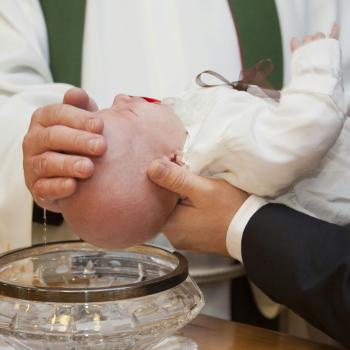Knowing how to receive Jesus' words on divorce today is difficult. Thomas Long, in his commentary on Matthew, points out that in the first-century world divorce meant more what we would call "abandonment." Someone simply walked out or threw the woman out. Abandonment has been made illegal in many cultures. This is a positive impact of the teachings of the Sermon on the Mount on divorce.
In my pastoral work with people, I have often seen these verses function to make women feel guilty for leaving abusive marriages or for having been left by their husbands. Matthew 5:31-32 is used to infuse them with perpetual guilt over their divorced status and to paralyze them from making new commitments.
Says Long, "The most important need . . . is to discern what lies at the heart of Jesus' words, just as Jesus discerned what lay at the heart of the Mosaic law. Marriage is intended to be a communion between two people that expresses, in their mutual fidelity, the faithfulness of God. It is intended to be a place of safety, nurture, and honor for person. In Jesus' day, the customs and practices of divorce were a direct assault on those values" (60).
Wisdom is needed in applying Jesus' words for today in those instances when exiting an untenable, abusive, loveless relationship is more in keeping with the heart of the law than staying in it.
Oaths
With regard to swearing and oaths, when we speak from a pure heart, we speak the truth and do not need to swear by anything, since our word can be relied on as it stands (verse 37). The Old Testament law condemned false oaths, promising in the name of God to do something and then not doing it (Lev. 19:12). Jewish tradition was concerned about frivolous oaths. Jesus dismisses oaths of every kind. To utter the name of God was to invoke God's presence. To do so lightly, in trivial everyday matters, was to seek to use God's power rather than put oneself at God's service (Long 61).
Anger and Murder
Murder is prohibited in the Ten Commandments (Ex. 20:13; Dt. 5:17). The Pentateuch states that the one who commits murder will be put to death (Ex. 21:12; Lev. 24:17). Jesus adds to traditional teaching by saying that those who direct anger toward another and speak insulting words should, or will, suffer punishment. Murder begins as a matter of the heart. The source of murder must be uprooted. Anger must be eradicated. (Allison, 62)
Some interpreters wish to make this statement less absolute, to soften it to allow for righteous anger. After all, they say, the Hebrew Bible seems to make room for justified anger ("Be angry but sin not" Ps. 4:4). Scriptural figures become angry (Moses in Ex. 32:19; Jeremiah in Jer. 6:11). God is often said to be angry (Ex. 4:14).
But at the same time that the Hebrew Bible associates anger with God and major figures, it also warns against anger. Anger leads to nothing good (Eccl. 7:9; Ps. 37:8). Genesis 4 (Cain and Abel) and Jonah 4 (Jonah's temper tantrum) reveal the destructiveness and futility of anger. Rabbinic teachings speak against anger. The Babylonian Talmud (Nedarim 22b) states that angry students forget what they learn and become more and more stupid and the sins of angry people outweigh their merits (Allison, 68). The Hebrew Scriptures connect anger and sin (Ps. 4:4) and warn of the destructiveness of anger. "A harsh word stirs up anger" (Prov. 15:1).
Mark 3:5, in recounting Jesus' healing of the man with the withered hand, says "He looked around at them with anger . . . grieved at their hardness of heart . . ." Matthew, in his version of this healing (Mt. 12:9-14) omits that detail (Allison, 67).
Clearly Matthew wants to issue a strong warning about the dangers of harboring anger in the heart. At the same time, though, he offers reconciliation as an antidote to anger. New Testament scholar Dale Allison points out that the picture here is "not isolated individuals seeking to subdue their passions but disciples going about the often awkward task of trying to right perceived wrongs. . . . Matthew 5:21-26, which assumes that anger does not have power over us unless we consent, unless we allow it entry into our hearts, tells us that anger is not to be hidden or disregarded. Nor should we foolishly act upon its impulses. Anger should instead be dealt with by becoming the opportunity for repairing broken relationships. It is when rapport and harmony are established with the objects of anger that anger disappears" (Allison, 70).
I hesitate to cast a pall over our Valentine's Day chocolate and roses with an Edgar Allen Poe reference, but it can't be helped. I can't stop thinking about the title of his short story "The Tell Tale Heart." It's a macabre story of a man snuffing out the life of another and burying him under the floorboards, then hearing his heart pounding in his ears.
My only excuse for using this analogy is that this text, in which Jesus reveals the inward sickness that is the source of so many outward symptoms, is hardly the stuff of which Hallmark cards are made. I hear a heart throbbing throughout this passage, a telltale heart. We may be confident that we're not wearing our heart on our sleeve. We may be sure that we've buried it beneath the floorboards, out of sight of the world. But if it contains angry thoughts, lustful intentions, and disrespect for God and others, there is no way it will stay our little secret. What's in your heart this Valentine's Day?
Works Cited
Dale C. Allison, The Sermon on the Mount: Inspiring the Moral Imagination (New York: The Crossroad Publishing Company, 1999)
Richard Kearney, Wake of Imagination: Toward a Postmodern Culture (New York: Routledge, 1988)
Thomas G. Long, The Westminster Bible Companion Commentary on Matthew (Louisville, Kentucky: Westminster John Knox Press, 1997).





